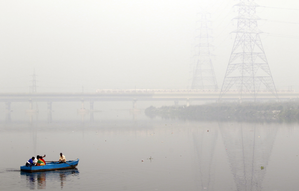8,500 tonnes of antibiotics from human use contaminating rivers worldwide: Study
By IANS | Updated: May 12, 2025 17:57 IST2025-05-12T17:50:22+5:302025-05-12T17:57:42+5:30
New Delhi, May 12 About 8,500 tonnes of antibiotics -- nearly one-third of what people consume annually -- ...

8,500 tonnes of antibiotics from human use contaminating rivers worldwide: Study
New Delhi, May 12 About 8,500 tonnes of antibiotics -- nearly one-third of what people consume annually -- end up in river systems around the world each year, significantly promoting drug resistance and harming aquatic life, according to a study.
The study, led by researchers from McGill University in Canada is the first to estimate the scale of global river contamination from human antibiotics use.
"While the amounts of residues from individual antibiotics translate into only very small concentrations in most rivers, which makes them very difficult to detect, the chronic and cumulative environmental exposure to these substances can still pose a risk to human health and aquatic ecosystems," said lead author Heloisa Ehalt Macedo, a postdoctoral fellow in geography at McGill.
For the study, published in the journal PNAS Nexus, the research team used a global model validated by field data from nearly 900 river locations.
They found that amoxicillin -- the world's most-used antibiotic -- is the most likely to be present at risky levels. The risk was especially found in Southeast Asia, where rising use and limited wastewater treatment amplify the problem.
While antibiotics are crucial for global health treatments, the "results indicate that there may be unintended effects on aquatic environments and antibiotic resistance", said Bernhard Lehner, Professor in global hydrology at McGill's Department of Geography.
The research calls for mitigation and management strategies to avoid or reduce their implications, Lehner said.
Notably, the findings did not consider antibiotics from livestock or pharmaceutical factories, both of which are major contributors to environmental contamination.
"Our results show that antibiotic pollution in rivers arising from human consumption alone is a critical issue, which would likely be exacerbated by veterinary or industry sources of related compounds," said Jim Nicell, an environmental engineering professor at McGill.
The team called for monitoring programmes to detect antibiotics or other chemical contamination of waterways.
Disclaimer: This post has been auto-published from an agency feed without any modifications to the text and has not been reviewed by an editor
Open in app